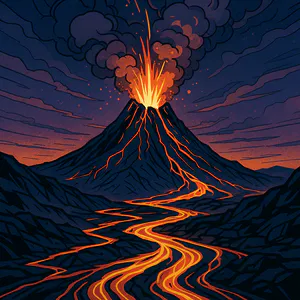Generate volcano names
More Place Name Generators- <% result.name %>
Discover all Story Shack apps
Ignite Your Imagination with Fiery Names
Naming a volcano can set the stage for epic tales of adventure and danger. Use these thought-provoking questions to inspire unique and captivating volcano names that resonate with the essence of your story.
- What geological features define your volcano's landscape?
- What historical events or myths surround this volcano that could influence its name?
- How does the volcano interact with the surrounding environment and its inhabitants?
- What emotions or themes do you want the name to evoke in your audience?
- What unique characteristics or phenomena does your volcano exhibit that could inspire its name?
Frequently Asked Questions
Explore the most common inquiries about the Volcano Name Generator and discover how it can elevate your creative projects.
How does the Volcano Name Generator work?
It utilizes a blend of linguistic elements and thematic concepts to produce distinctive volcano names with each click.
Can I choose a specific type of volcano name?
Currently, custom input isn't available; however, you can generate names repeatedly until you find one that sparks your imagination.
Are the generated names unique?
The names are randomly generated; with endless clicks, you'll uncover a variety of options, though some may share similarities.
How many names can I generate?
You can generate an unlimited number of volcano names; simply click 'Generate' as often as you wish.
How do I save my favorite volcano names?
You can easily copy a name by clicking on it, or utilize the heart icon to bookmark it for future reference.
What are good volcano names?
There's thousands of random volcano names in this generator. Here are some samples to start:
- Mount Ballem
- The Roasting Mountain
- Mount Eatonora
- The Crimson Summit
- The Obsidian Vertex
- The Thunder Summit
- Mount Parity
- Mount Moltencore
- The Nefarious Mountains
- Mount Lamajour
About the creator
All idea generators and writing tools on The Story Shack are carefully crafted by storyteller and developer Martin Hooijmans. During the day I work on tech solutions. In my free hours I love diving into stories, be it reading, writing, gaming, roleplaying, you name it, I probably enjoy it. The Story Shack is my way of giving back to the global storytelling community. It's a huge creative outlet where I love bringing my ideas to life. Thanks for coming by, and if you enjoyed this tool, make sure you check out a few more!



















































